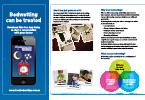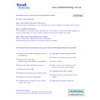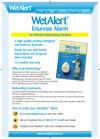Minirin Spray
Generic Name: Desmopressin acetate
Product Name: Minirin Spray
Indication
Minirin Spray is most commonly prescribed to treat primary nocturnal enuresis (bed wetting) in adults and children aged 6 years and older. Individuals who experience bed wetting will only be prescribed Minirin Spray if management with a bed wetting alarm fails or when a bed wetting alarm is contraindicated or inappropriate.
Minirin Spray should only be used by individuals who cannot take oral forms of Minirin.
Minirin Spray may also be used to treat anti-diuretic hormone-sensitive cranial diabetes insipidus, a type of pituitary disorder characterised by the production of large amounts of urine and constant thirst.
Minirin Spray may also be used in the diagnosis and assessment of kidney function.
In Australia, the cost of Minirin Spray (6mL – 60 doses of 10 µg) is currently subsidised under the Government’s Pharmaceutical Benefits Scheme.
 | Download the guide Bedwetting Can Be Treated. |
 | Order a FREE information pack. This pack includes an information leaflet and a copy of the “Understanding Bedwetting” DVD. |
Action
Desmopressin, the active ingredient in Minirin Spray, is a synthetic version of the naturally occurring substance called vasopressin, which is produced in the pituitary gland.
Vasopressin has several actions in the body, including reducing the amount of urine produced by the kidneys. Desmopressin works in the same way as vasopressin.
Dose advice
Dose information
How to take Minirin Spray
Always administer the dose prescribed by the doctor. Continue to take the medicine even if you begin to feel well. If you stop taking the medicine, symptoms such as thirst, frequent urination or bed wetting may return.
The recommended dose of Minirin Spray varies depending on your age and the condition you are treating.
Minirin Spray is administered via the nostrils. Never inhale the spray through the mouth. The medicine is packaged in a nasal spray dispenser, which releases 10 µg of the active ingredient of Minirin Spray each time you press down on the pump. Before using Minirin Spray, read the instructions for using the spray device which come with the medicine.
Before you use the nasal spray device for the first time, you will need to prime the device to ensure it delivers the correct dose of medicine. To do this, remove the protective cap from the device and press down on the white collar of the applicator four times, or until an even spray is released. If ? 7 days elapse when Minirin Spray is not used, the spray device should be primed again prior to further use. Once the device is primed, the nozzle should be placed in the nostril to administer the dose.
Dose for nocturnal enuresis (bed wetting)
When used to treat bed wetting in adults and children ? 6 years of age, your doctor will usually begin by prescribing a daily dose of 20 µg of Minirin Spray, to be taken at bedtime. You will need to administer one spray (10 µg) into each nostril. Always deliver half the dose to each nostril. You should not administer both sprays to the same nostril. You will usually take the medicine for 1 to 3 months, after which you will stop taking the medicine for 1 week so that your doctor can assess your condition. If bed wetting continues, you may need to take the medicine for a further 1 to 3 months.
If the 20 µg dose is ineffective in resolving your condition, your doctor may increase the dose to 40 µg (two sprays into each nostril). If your condition responds to a 20 µg dose, your doctor may reduce the dose to 10 µg (one spray). As the spray dispenser releases 10 µg of medicine each time you press the nozzle release, you will need to use a different device to deliver the medicine if you are taking less than 10 µg per day.
Fluid intake must be restricted from one hour before until 8 hours after administration of Minirin Spray. Consume minimal liquids (no more than a few sips), only what is sufficient to satisfy your thirst in this period.
Dose for anti-diuretic hormone-sensitive cranial diabetes insipidus
If you are being treated for anti-diuretic hormone-sensitive cranial diabetes insipidus, you should take the dose prescribed by your doctor, which is usually between 10 µg to 40 µg daily for adults and between 2.5 µg to 20 µg daily for children. The dose will be adjusted by your doctor to suit your personal requirements. Usually you will need to take your medicine twice a day. Treatment for this condition is typically lifelong.
Dose for diagnosis of kidney concentrating capacity
If Minirin Spray is prescribed as a test for kidney concentrating capacity, adults will usually be prescribed a single dose of up to 40 µg at any one time. Children should receive a single dose of up to 20 µg at any one time. Infants should receive a single dose of up to 10 µg under careful supervision in hospital. Fluid intake must be limited to 500 mL from 1 hour before until 8 hours after administration of Minirin Spray.
Missed doses
If you miss a dose of your medicine, do not take a double dose to catch up for the missed dose. If you are taking the medicine to control bed wetting, take the next dose as normal. If you are using Minirin Spray for cranial diabetes insipidus, take the dose as soon as you remember. You may then need to adjust the timing of your next dose. Talk to your doctor about when to take the next dose.
Fluid intake
When using Minirin Spray, it is important to keep the amount of fluid in your body balanced. Do not let yourself get too thirsty or drink too much water whilst using Minirin Spray.
If you are using Minirin Spray to treat bed wetting, you will need to restrict your fluid intake from 1 hour before until 8 hours after administration of Minirin Spray. Drink as little as possible in this period and take no more than a few sips of water if you need to satisfy your thirst.
If your doctor has prescribed Minirin Spray as a test of your kidney capacity, you will also need to restrict your fluid intake from 1 hour before until 8 hours after administration of Minirin Spray. You should not drink more than 500 mL of fluid in that period.
Overdose
Taking too much Minirin Spray can cause your body to retain too much fluid and lead to serious health problems. Symptoms of a Minirin Spray overdose include difficulty passing urine, rapid weight gain (caused by the accumulation of fluid in your body), confusion, persistent headache, seizures and drowsiness. If you take more than the prescribed dose of Minirin Spray, or if someone else uses the spray, contact your doctor or the Poisons Information Centre for advice (telephone number in Australia 13 11 26). You should do this even if you feel well.
If you have any queries about the correct way to use Minirin Spray, please ask your doctor.
Contraindications
Minirin Spray should not be used under certain conditions. Tell your doctor if you:
- Have an allergy to desmopressin acetate (the active ingredient) or any of the excipients (inactive ingredients) in the product;
- Drink large amounts of fluid, such as when you have polydipsia: Polydipsia is a diabetes-related condition characterised by excessive thirst. You should not use Minirin Spray if you have polydipsia or another condition that causes you to drink a lot of fluid. Restrict fluid intake from 1 hour before until 8 hours after taking Minirin Spray. Drinking too much fluid can lead to complications, including water retention and/or hyponatraemia. These conditions may occur with or without accompanying warning signs and symptoms such as headache, nausea and vomiting, weight gain and convulsions;
- Have a condition called syndrome of inappropriate anti-diuretic hormone secretion (SIADH): SIADH is a condition that causes you to secrete too much anti-diuretic hormone (ADH);
- Have heart problems characterised by shortness of breath, swelling of the feet or legs due to fluid accumulation;
- Have a kidney disorder: Individuals with moderate and severe forms of a kidney condition called renal insufficiency should not take Minirin Spray;
- Have low levels of sodium in your blood, a condition known as hyponatraemia.
- Have a blood clotting disorder called Type IIB von Willebrand’s disease: Minirin Spray affects how your blood clots.
Precautions
Special care needs to be taken before you start using Minirin Spray. Tell your doctor if you:
- Have an allergy to the anti-diuretic hormone (vasopressin);
- Have an allergy to desmopressin (the active ingredient of Minirin Spray) or any other medicines, foods, preservatives or dyes;
- Have a fluid imbalance in your body: This means that you either have too much or too little fluid in your body. If you are either dehydrated or overhydrated, your doctor will need to treat that imbalance before you start using Minirin Spray;
- Develop water retention and/or hyponatraemia, which may or may not cause signs and symptoms including headache, nausea and vomiting, weight gain and convulsions. If you develop these signs and symptoms whilst taking Minirin Spray, stop taking the medicine immediately and see your doctor;
- Have cardiovascular disease;
- Have blood vessel disease;
- Have low blood pressure;
- Have cystic fibrosis, which is often associated with fluid or salt imbalance;
- Have any other condition that causes salt or fluid imbalance;
- Have an infection or allergy affecting your nasal passages: Minirin Spray may not work properly and may make the infection/congestion worse. Your doctor may take you off Minirin Spray until the infection or allergy clears up;
- Have a blood clotting disorder;
- Have a condition that affects your bladder;
- Have difficulty passing urine;
- Cannot take oral forms of Minirin: Minirin Spray should only be used by people who are unable to take the oral forms of Minirin (Tablets or Melt);
- Become ill while using Minirin Spray: Your doctor may need to monitor your condition or interrupt your Minirin Spray treatment;
- Use another medicine that affects the way Minirin Spray works, or is affected by Minirin Spray. These medicines include:
- Medicines that release anti-diuretic hormone, including tricyclic antidepressants, chlorpromazine and carbamazepine. Using these medicines at the same time as Minirin Spray increases the risk of excessive fluid accumulating in the body;
- edicines that increase fluid retention. For example, non-steroidal anti-inflammatory drug (NSAIDs);
- Any other medication that may induce water retention/hyponatraemia.
Pregnancy
Minirin Spray is a Pregnancy Category B2 medication. Studies have not been conducted to determine whether the medicine is safe when used during pregnancy. Tell your doctor if you are pregnant or plan to become pregnant whilst taking Minirin Spray so that they can discuss the risks and benefits of using the drug during pregnancy.
Breastfeeding
You should not use Minirin Spray if you are breastfeeding. The medicine is passed into your breastmilk. Studies have not been done to determine whether or not the medicine is safe when used during breastfeeding.
Children
Minirin Spray can be used by children to treat cranial diabetes insipidus and by children aged 6 years and older to treat bed wetting. The medicine can also be used as a test of kidney function in children, but this must be done under careful supervision in a hospital if your child is < 1 year old. Children should always be supervised by an adult when taking the medicine to ensure they use the correct dose. It may also be necessary to monitor children being treated for bed wetting or diagnostic testing to ensure they restrict their fluid intake after they have taken the medicine.
Storage
The drug should be stored below 25°C, protected from light and kept in its original packaging. Minirin Spray should not be frozen.
Do not take the medicine if it has passed its expiry date or if the packaging show signs of tampering. Return damaged or expired medicines to your pharmacy.
Schedule
Minirin Spray is a Schedule S4 (prescription only) medication.1
Common side effects
All medicines can have side effects. Most commonly the side effects are minor; however, some can be more serious. Usually the benefits of taking a medication outweigh the associated side effects. Your doctor would have considered these side effects before starting you on Minirin Spray.
Hyponatraemia is an infrequent but serious side effect of Minirin Spray. Mild stomach cramps, flushing, rhinitis (inflammation of the mucous membranes which line the nose), nasal congestion, nausea and transient headache have been reported infrequently when high doses of Minirin Spray have been used. Most people using Minirin Spray find that it causes few problems.
Since Minirin Spray was released for sale, there have been isolated cases of allergic skin reactions, more severe general allergic reactions and emotional disturbances in children reported.
Other infrequent adverse effects of Minirin Spray (when used to treat bed wetting) associated with drinking too much water include water poisoning (dangerous dilution of electrolytes in the blood), convulsions, fainting and unconsciousness.
Very common side effects
Very common side effects are those that occur in more than 10% of people given Minirin Spray. These include:
- N/A
Common side effects
Common side effects are those that occur in 1–10% of people given Minirin Spray. These include:
- Abdominal pain;
- Asthenia (lack of strength);
- Chills;
- Headache;
- Dizziness;
- Rhinitis;
- Nose bleed;
- Nostril pain;
- Conjunctivitis;
- Excessive fluid accumulated in the eyes;
- Lacrimation disorder (disorder of tear production);
- Gastrointestinal disorder;
- Nausea.
Uncommon side effects
Side effects that occur in less than 1% of people given Minirin Spray are considered uncommon. People do not necessarily experience any of these side effects, so do not become alarmed by this list:
- N/A
Rare side effects
Rare side effects are those that occur in 0.01–0.1% of people given Minirin Spray. These include:
- Hyponatraemia (water retention and low sodium levels in the blood), which can cause serious illness.
If you experience any of the listed side effects, or any other symptoms that appear abnormal or unusual, please tell your doctor.
Useful resources:
 | For more information about the causes of and treatment options for bedwetting, see Treat Bedwetting. |
 | To help you understand why you or your child wets the bed, complete this checklist and take it to your doctor. |
 | Where Minirin (desmopressin) is not appropriate, a bed wetting alarm may be used. |
Related Documents
References
- Product Information: Minirin Spray. Gordon, NSW: Ferring Pharmaceuticals Pty Ltd; 8 May 2012.
- Australian Government: Department of Health and Ageing. PBS Schedule Search. Online (cited 7 December 2012). Available from: URL link
- Consumer Medical Information: Minirin Spray. Gordon, NSW: Ferring Pharmaceuticals Pty Ltd; May 2012.
Diseases treated by this drug:
For further information talk to your doctor.
Dates
Tags
Created by:

 Login
Login













